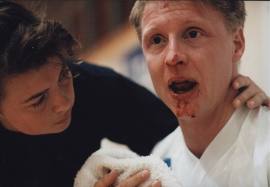As shown in the photo, the business of handball is a ‘bloody serious’ matter for Hans Vestberg (here in his younger days as an enthusiastic player). As many who followed the World Championship in Sweden know, he combines his professional life as Managing Director for the world-renowned Ericsson group with a continued handball involvement as the President of the Swedish Handball Federation. This combination is in many ways symbolic for the following story.
In connection with the World Championship in Sweden, the Swedish Men’s Elite League (HEH) announced ambitious plans to try to become more competitive. A particular frustration is that the Swedish top clubs frequently lose strong players to financially stronger clubs abroad. While HEH certainly does not see it as realistic to resist the pressures from Bundesliga clubs or the richer Spanish clubs, it is a particular objective to become competitive enough to avoid that the Swedish clubs are drained by clubs in neighboring countries, especially Denmark. Perhaps there is also some special pride and prestige involved in not losing out to the immediate neighbors.
Put differently, the HEH wants the Swedish League to acquire a status just below the counterparts in Germany and Spain. I had a chat with Stefan (Abbe) Albrechtson, strong man in HEH and in Saevehof (incl. Partille Cup). He emphasized that the league is not in any way seeking some kind of separation from the Swedish federation, along the lines of the situation in Germany and Spain. On the contrary, he and his colleagues in the Swedish top clubs look to the federation for coordination and support. Educational efforts and exchanges of best practices need to be synchronized. Clearly, the persona and spirit of someone like Hans Vestberg is not likely to hurt that effort.
The Swedish tax legislation makes it difficult for Swedish clubs to compete with counterparts in other countries, and the chances that new major sponsors will spontaneously come forward are also limited. The focus must be on working more efficiently, in the sense of being more business-like, stronger in the emphasis on publicity, TV coverage and service to the spectators. HEH has its own web TV production with about 60 games per year, and the national TV channels now cover around 50 games per year after previously having wanted no involvement at all. The top clubs now typically have modern arenas. Abbe does not believe in hand-picking teams from larger cities or having a ‘closed’ league. The traditions in favor of the current system, with the Elite League as a top of a pyramid are far too strong. But using business contacts and knowledge in the competition for local or regional sponsors is critical.
Clearly, any hopes of moving up to a higher level more generally depend on a stronger business sense among the handball leaders. Traditional methods do not work any longer. The clubs need a stronger outreach in the community and also regionally. Coaches and people with technical handball knowledge need to be supplemented by strong managers, financial experts and organizers. Abbe surprised me a bit by saying that there is not much of an effort to draw on the experience of other sports such as football or icehockey. He feels that the methods needed for handball depend more on the special features of handball. Attracting people and money involves ‘selling’ handball as a specific product.
It is really interesting to hear this optimism and to see such initiatives at a time when many major clubs in other countries are struggling. Most of the clubs in the Spanish top league ASOBAL are on shaky ground. And in Denmark there are recent studies indicating that the majority of the top men’s and women’s club are encountering increasing problems. For instance, the creation of the new top club AGK Copenhagen is seen with skepticism and fear by many in Danish handball, as it may be causing too much of a polarization between strong and weak, and setting the bar far too high for virtually anyone else. But going back to the Swedish scenario: at this moment in time, the economy is in a much more favorable situation than in most other European countries. There remains a focus on quality of life, with sports as an important area for participation and enjoyment. So perhaps this is the right moment for optimistic initiatives.
